Namibia safari
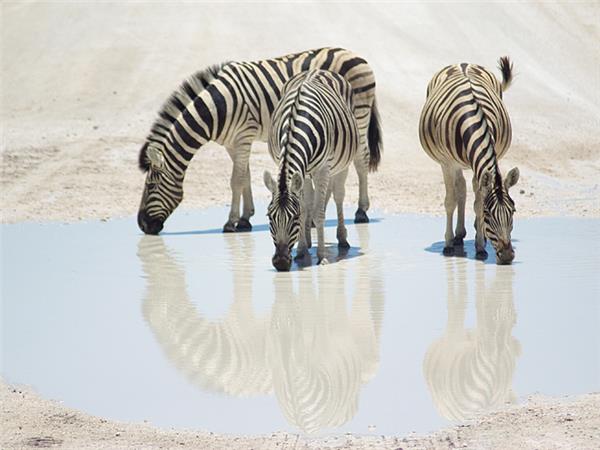
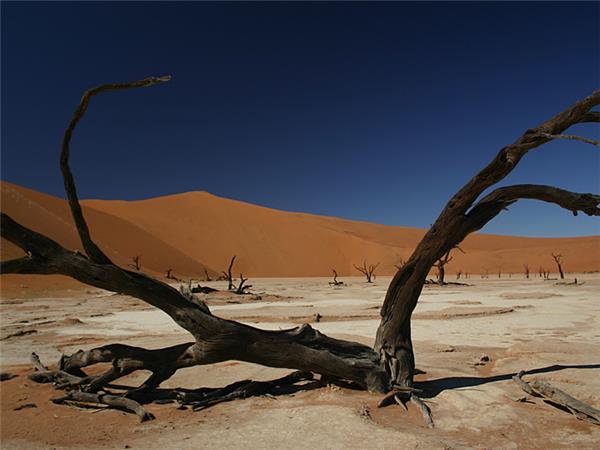
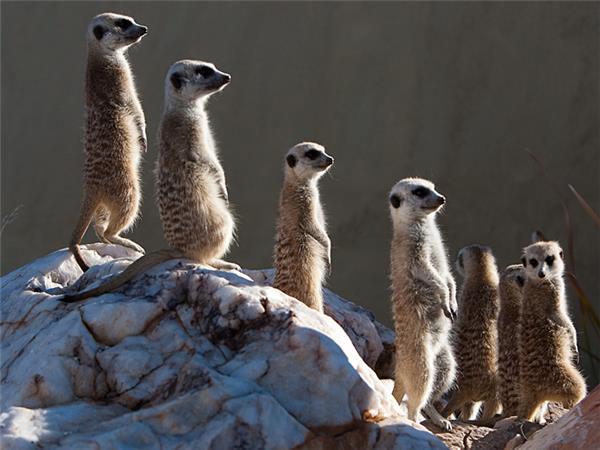
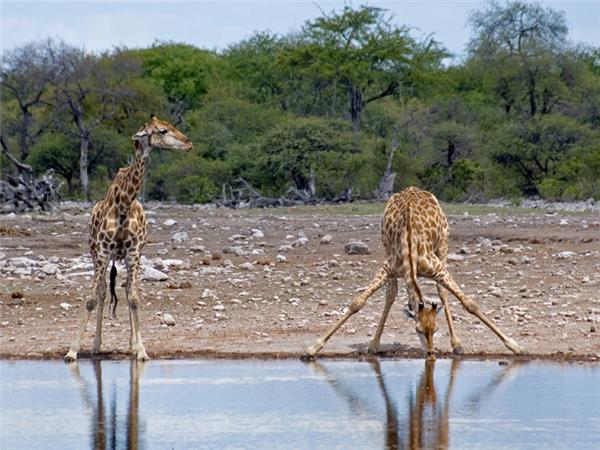
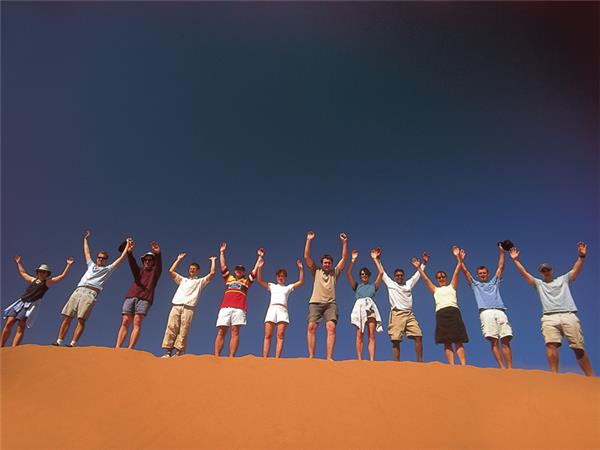
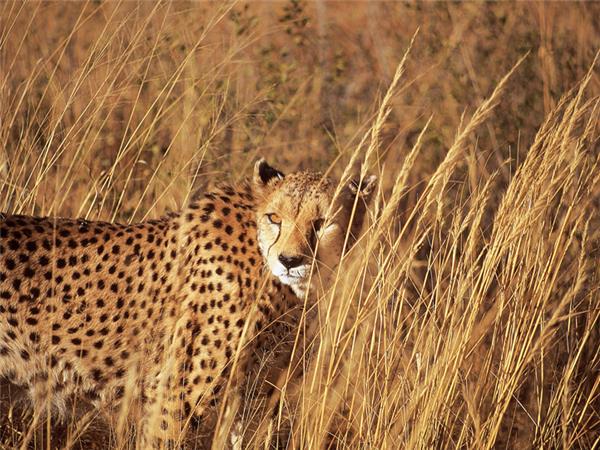
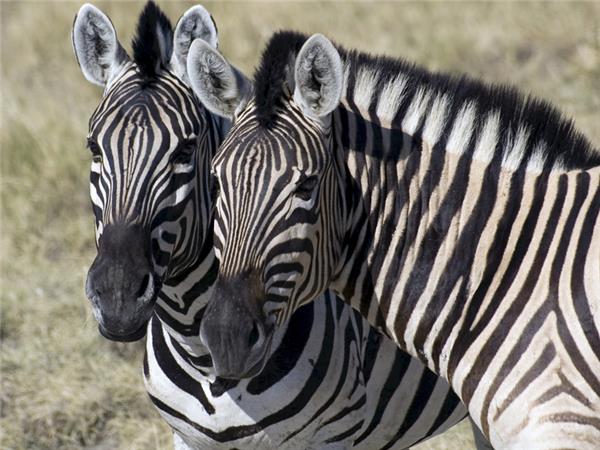
Two weeks in Namibia, fully guided and staying in either lodges or campsites. The choice is yours. No matter where you wake up, it will blow your socks off.
Windhoek Namib Desert Sossusvlei Swakopmund Etosha National Park Waterberg Plateau Africat Foundation
Price
US $3080ToUS $4195excluding flights
More info
Optional single supplement from £336 - £728.
Minimum age 16.
Minimum age 16.
Last minute
Late availability on these dates: 23 Dec, 11 Feb
Description of Namibia safari
Map
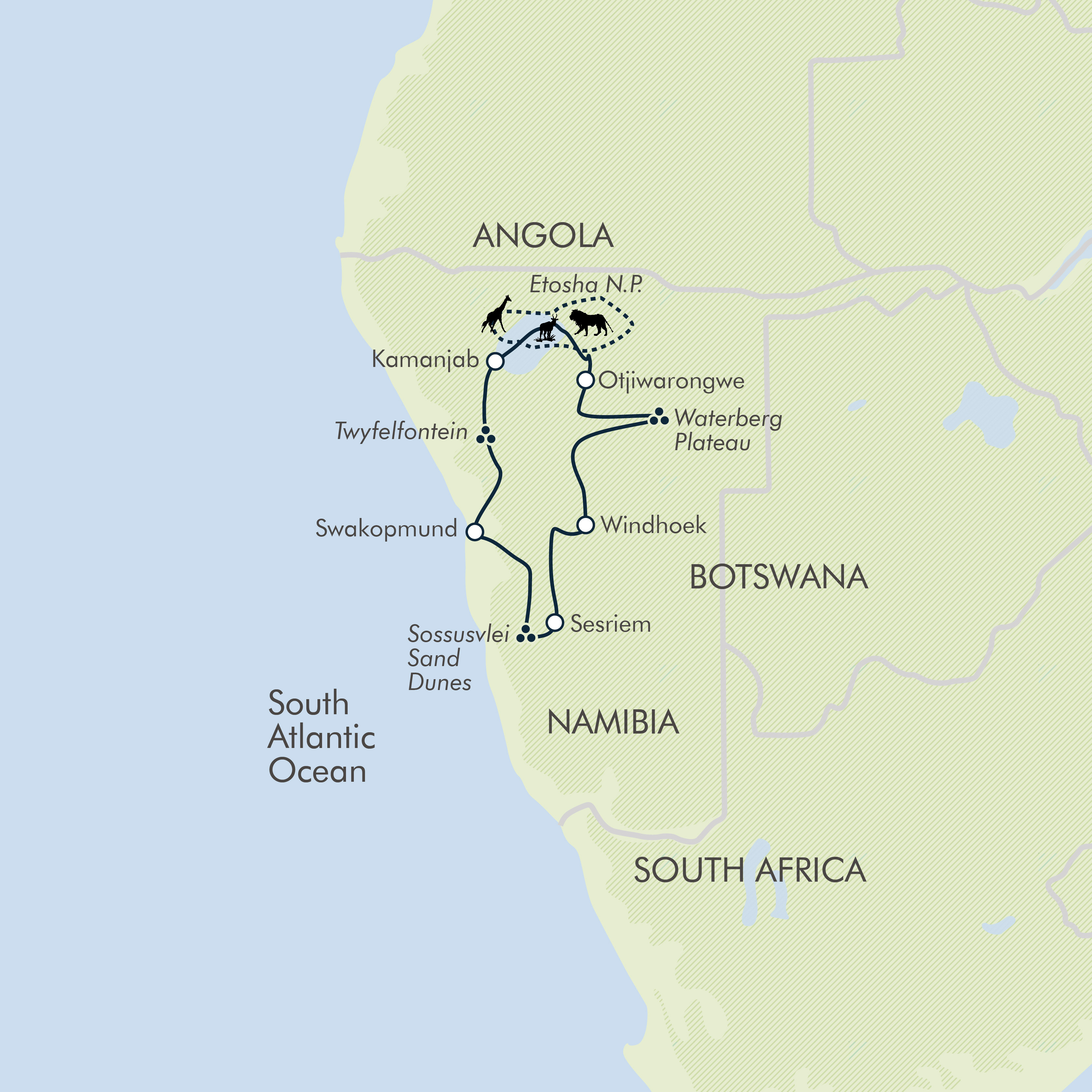
Price information
Check dates, prices & availability
Travel guides
There is something about traveling in the desert. The harsh beauty of landscapes shaped by the elements; the generosity of the people that live there...
Namibia is a destination that you want to zoom out from to really get a sense of just how massive this country is.
Vacation information
Small group tour, ideal for solos & couples:
Small group travel is not large group travel scaled down. It is modeled on independent travel – but with the advantage of a group leader to take care of the itinerary, accommodation and tickets, and dealing with the language. It’s easy to tick off the big sights independently – but finding those one-off experiences, local festivals, traveling markets and secret viewpoints is almost impossible for someone without the insider knowledge gained from years in the field. For those with limited time, a small group tour will save valuable time in planning, and on vacation.
Reviews
2 Reviews of Namibia safari
3.5 out of 5 stars
Reviewed on 28 Nov 2018 by Michael Hall
1. What was the most memorable or exciting part of your vacation?
Climbing Dune 45 at sunrise.
Watching animals visiting waterholes in Etosha.
Landscapes and sunsets.
2. What tips would you give other travelers booking this vacation?
Be prepared for very hot, sandy walks!
Don't believe everything you read in the operators itinerary.
3. Did you feel that your vacation benefited local people, reduced environmental impacts or supported conservation?
Very little. It provided employment opportunities and excess food was passed to local people. However we were forced to buy water in plastic bottles from shops throughout our trip. There was a visit to a 'cheetah sanctuary' included in the trip, which was not the conservation project advertised and was extremely distasteful.
4. Finally, how would you rate your vacation overall?
Namibia was a fascinating country and I would like to visit again. But I would not go on this trip or use this tour company again, given the poor service I received.
Read the operator's response here:
We were pleased that Michael found Namibia to be a fascinating country and enjoyed watching animals visiting waterholes in Etosha, although we regret that he was disappointed with aspects of the trip. The usual process on this tour is for clients to bring a water bottle with them and to fill it up at each campsite, lodge, or from the water tank in the tour vehicle.
We were concerned to learn of Michael's experience and so have asked our local operations
manager to ensure that all tour leaders are advising clients correctly regarding this matter, so that single-use plastic bottles are not being bought and used unnecessarily.
The enclosure for a number of rescued cheetahs at the Namib Carnivore Conservation Centre used to be much bigger, approximately 500 hectares, but earlier this year the size was, regrettably, significantly reduced as one of the fences did not meet Ministry of Environment and Tourism standards. Whilst we feel it is a project worth supporting, and we are of the understanding that the conservation center will be able to re-upgrade to a larger enclosure again in March 2019, we have asked our local operations manager to ensure that tour leaders clearly explain the situation regarding the smaller enclosure to groups in the interim. Should we continue to receive similar feedback, we will remove the Namib Carnivore Conservation Centre from the itinerary until the situation improves.
We were concerned to learn of Michael's experience and so have asked our local operations
manager to ensure that all tour leaders are advising clients correctly regarding this matter, so that single-use plastic bottles are not being bought and used unnecessarily.
The enclosure for a number of rescued cheetahs at the Namib Carnivore Conservation Centre used to be much bigger, approximately 500 hectares, but earlier this year the size was, regrettably, significantly reduced as one of the fences did not meet Ministry of Environment and Tourism standards. Whilst we feel it is a project worth supporting, and we are of the understanding that the conservation center will be able to re-upgrade to a larger enclosure again in March 2019, we have asked our local operations manager to ensure that tour leaders clearly explain the situation regarding the smaller enclosure to groups in the interim. Should we continue to receive similar feedback, we will remove the Namib Carnivore Conservation Centre from the itinerary until the situation improves.
Reviewed on 01 Oct 2017 by Maryanne Roach
1. What was the most memorable or exciting part of your vacation?
Sossusfly and the waterhole at Okaukuejo
2. What tips would you give other travelers booking this vacation?
Although theoretically available in many places (lodges, hotels and coffee shops - at a charge in Namibian Wildlife Resorts), wi-fi is often "down". Expect long driving times and bumpy roads - we did over 3100 km, including game drives.The weather is much cooler in Swakopmund than elsewhere.
3. Did you feel that your vacation benefited local people, reduced environmental impacts or supported conservation?
Yes.
4. Finally, how would you rate your vacation overall?
Excellent. Our leader (Ronney) did much, far beyond the call of duty.
Responsible Travel
As the pioneers of responsible tourism, we've screened this (and every) vacation so that you can travel knowing it will help support the places and people that you visit, and the planet. Read how below.
Planet
Accommodation and Meals:For lodge departures, we spend 12 nights in lodges, chalets or hotels. For camping departures, we spend 9 nights full-service camping and 3 nights in guesthouses. All of the accommodation we use is locally staffed and local produce and supplies are used, which benefits the wider community. Energy saving bulbs and water conservation signs are common in our permanent accommodations, whilst camping is a great way to reduce environmental impact in itself. We are careful with managing waste, litter and noise pollution. Meals will generally consist of fresh fruit, cold cheese and meat, bread rolls and more traditional dishes like Potjie (Stew) or Braai (BBQ). Where meals are not provided, we encourage clients to support local restaurants. In Windhoek, clients can even try local game meat varieties such as Oryx, Zebra and Crocodile!
Activity:
During wildlife safaris and game drives we behave responsibly with any wildlife we may come into contact with and this is reinforced by our staff and by an environmental code of conduct which is posted in every vehicle we use. Twenty-five percent of all park entrance fees paid is reinvested by the MET (Ministry of Environmental and Tourism) through the Game Products Trust Fund into essential infrastructure and services related to tourism in Namibia’s parks. So by running our game drives in Etosha National Park, we are contributing to local community initiatives and helping to fund the protection of the wide range of species which live there. Our optional activities on day 6 (dolphin watching, sand-boarding, quad-biking etc.) are also run by local businesses, so we encourage people to go on these excursions.
Conservation:
On this trip we visit the Africat Foundation. The foundation was set up to assist with the long-term conservation of Namibia’s large carnivores through research, education and rehabilitation. We will meet the center's resident cheetahs (cheetahs are the most endangered big cat in Africa but Namibia has the world’s largest free roaming population) and learn about the conservation efforts taking place.
UK Office:
It all starts at home so we have first worked at reducing our carbon footprint in our UK Offices. Through energy conservation measures and recycling policies, we are proud to be actively reducing the waste produced and our impact on the environment. We support various projects all over the world to try and give something back to the places we visit.
Group Size:
This small group tour has a maximum of 16 participants, meaning that we have a low impact on the environments and communities we visit and are able to ensure that we do not disrupt or lead to the displacement of local people. The small number also allows us to stay in unique, family-run hotels that cannot benefit from coach tours and other mass tourism due to their limited sizes.
People
Local Craft and Culture:We visit Swakopmund, which is a small German colonial resort town with quaint cake shops and coffee houses and a center for adrenaline activities. This is a great chance to explore local businesses and learn about Namibian culture on an optional township tour. Clients can support the local economy by buying beer brewed in the area or – if you’re feeling brave- trying a regional specialty like Mowpane worms. There are also plenty of craft markets in Swakopmund, as well as on route to Etosha, selling wooden carvings, jewellery and material Herero dolls.
A Fair Deal:
Our tour operators are 100% African owned and each member of staff has a huge passion and knowledge of Namibia. This is not only beneficial for our clients, who get real insider’s knowledge on our tours, but this benefits the economy by creating local jobs and ensuring that all income stays within Southern Africa. Our local employees are trained on responsible tourism issues and are given refresher courses regularly. When visiting places like Etosha, we employ an experienced guide from that area which helps surrounding communities benefit directly from our tours.
Popular similar vacations
Namibia safari and vacation
From £3880 - £4245 12 days excluding flights
A fabulous small group guided trip in Nambia
Namibia self drive safari
From £2250 14 days excluding flights
An iconic self-drive safari through north and south Namibia
Namibia and Botswana camping safari
From US $2815 - US $2825 21 days excluding flights
Camping safari to Namib desert, Caprivi, Etosha & Okavango











